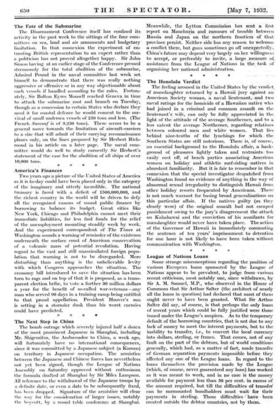The Fate of theSubmarine . • • , The Disarmament confere nce
itself has confined its activity in the past week to the sittings of the four com- mittees on sea, land and air armaments. and budgetary limitation. In that connexion the experiment of en- trusting British representation to an expert rather than a politician has not proved altogether happy. Sir John Simon having at an earlier stage of the Conference pressed strenuously for the total abolition of the submarine, Admiral Pound in the naval committee last week set himself to demonstrate that there was really nothing aggressive or offensive or in any way objectionable about such vessels if handled according to the rules. Fortun- ately, Sir Bolton Eyres Monsen reached Geneva in time to attack the submarine root and branch on Tuesday, though as a concession to certain States who declare they need it for coastal defence he would consent to the sur- vival of small undersea vessels of 250 tons and less. (The French Surcouf is of 11,250 tons). There seems to be a general move towards the limitation of aircraft-carriers to a size that will admit of their carrying reconnaissance planes only, on the lines proposed by Sir Herbert Rich. mond in his article • on a later page. - The naval com- mittee Would do well to study earnestly Sir Herbert's statement of the case for the abolition of all ships of over
10,000 tons. *






































 Previous page
Previous page